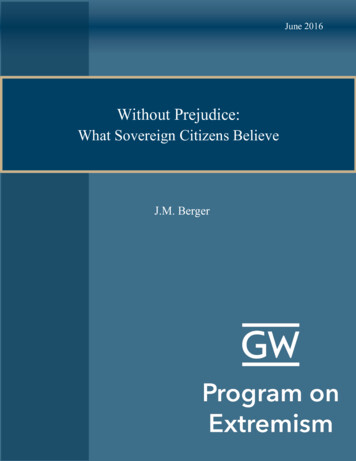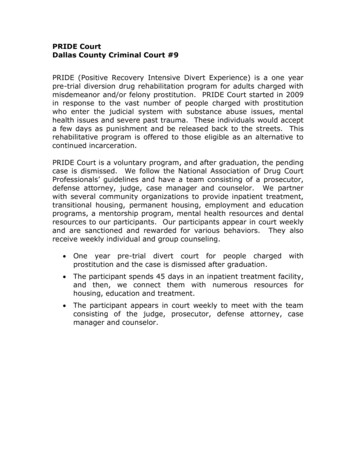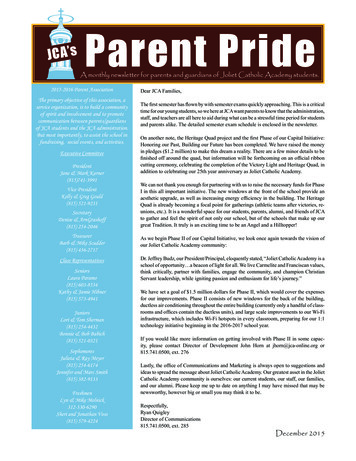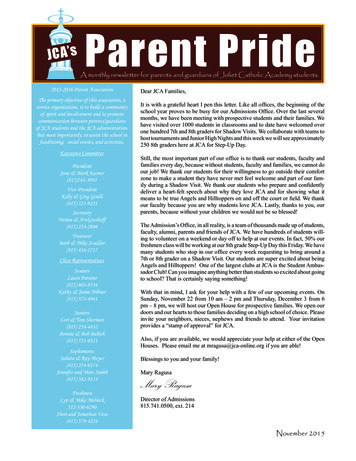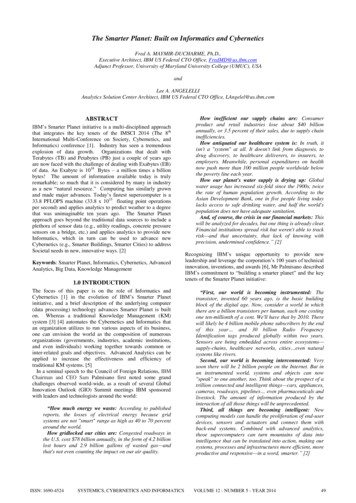
Transcription
Pride and PrejudiceBy Jane AustenDownload free eBooks of classic literature, books andnovels at Planet eBook. Subscribe to our free eBooks blogand email newsletter.
Chapter 1It is a truth universally acknowledged, that a single man inpossession of a good fortune, must be in want of a wife.However little known the feelings or views of such a manmay be on his first entering a neighbourhood, this truth isso well fixed in the minds of the surrounding families, thathe is considered the rightful property of some one or otherof their daughters.‘My dear Mr. Bennet,’ said his lady to him one day, ‘haveyou heard that Netherfield Park is let at last?’Mr. Bennet replied that he had not.‘But it is,’ returned she; ‘for Mrs. Long has just been here,and she told me all about it.’Mr. Bennet made no answer.‘Do you not want to know who has taken it?’ cried hiswife impatiently.‘YOU want to tell me, and I have no objection to hearing it.’This was invitation enough.‘Why, my dear, you must know, Mrs. Long says thatNetherfield is taken by a young man of large fortune fromthe north of England; that he came down on Monday in achaise and four to see the place, and was so much delightedwith it, that he agreed with Mr. Morris immediately; thathe is to take possession before Michaelmas, and some of his Pride and Prejudice
servants are to be in the house by the end of next week.’‘What is his name?’‘Bingley.’‘Is he married or single?’‘Oh! Single, my dear, to be sure! A single man of largefortune; four or five thousand a year. What a fine thing forour girls!’‘How so? How can it affect them?’‘My dear Mr. Bennet,’ replied his wife, ‘how can you beso tiresome! You must know that I am thinking of his marrying one of them.’‘Is that his design in settling here?’‘Design! Nonsense, how can you talk so! But it is verylikely that he MAY fall in love with one of them, and therefore you must visit him as soon as he comes.’‘I see no occasion for that. You and the girls may go, oryou may send them by themselves, which perhaps will bestill better, for as you are as handsome as any of them, Mr.Bingley may like you the best of the party.’‘My dear, you flatter me. I certainly HAVE had my shareof beauty, but I do not pretend to be anything extraordinary now. When a woman has five grown-up daughters, sheought to give over thinking of her own beauty.’‘In such cases, a woman has not often much beauty tothink of.’‘But, my dear, you must indeed go and see Mr. Bingleywhen he comes into the neighbourhood.’‘It is more than I engage for, I assure you.’‘But consider your daughters. Only think what an estabFree eBooks at Planet eBook.com
lishment it would be for one of them. Sir William and LadyLucas are determined to go, merely on that account, for ingeneral, you know, they visit no newcomers. Indeed youmust go, for it will be impossible for US to visit him if youdo not.’‘You are over-scrupulous, surely. I dare say Mr. Bingley will be very glad to see you; and I will send a few linesby you to assure him of my hearty consent to his marryingwhichever he chooses of the girls; though I must throw in agood word for my little Lizzy.’‘I desire you will do no such thing. Lizzy is not a bit betterthan the others; and I am sure she is not half so handsomeas Jane, nor half so good-humoured as Lydia. But you arealways giving HER the preference.’‘They have none of them much to recommend them,’ replied he; ‘they are all silly and ignorant like other girls; butLizzy has something more of quickness than her sisters.’‘Mr. Bennet, how CAN you abuse your own children insuch a way? You take delight in vexing me. You have nocompassion for my poor nerves.’‘You mistake me, my dear. I have a high respect for yournerves. They are my old friends. I have heard you mentionthem with consideration these last twenty years at least.’Mr. Bennet was so odd a mixture of quick parts, sarcastic humour, reserve, and caprice, that the experience ofthree-and-twenty years had been insufficient to make hiswife understand his character. HER mind was less difficultto develop. She was a woman of mean understanding, littleinformation, and uncertain temper. When she was discon Pride and Prejudice
tented, she fancied herself nervous. The business of her lifewas to get her daughters married; its solace was visiting andnews.Free eBooks at Planet eBook.com
Chapter 2Mr. Bennet was among the earliest of those who waitedon Mr. Bingley. He had always intended to visit him,though to the last always assuring his wife that he shouldnot go; and till the evening after the visit was paid she hadno knowledge of it. It was then disclosed in the followingmanner. Observing his second daughter employed in trimming a hat, he suddenly addressed her with:‘I hope Mr. Bingley will like it, Lizzy.’‘We are not in a way to know WHAT Mr. Bingley likes,’said her mother resentfully, ‘since we are not to visit.’‘But you forget, mamma,’ said Elizabeth, ‘that we shallmeet him at the assemblies, and that Mrs. Long promisedto introduce him.’‘I do not believe Mrs. Long will do any such thing. Shehas two nieces of her own. She is a selfish, hypocriticalwoman, and I have no opinion of her.’‘No more have I,’ said Mr. Bennet; ‘and I am glad to findthat you do not depend on her serving you.’Mrs. Bennet deigned not to make any reply, but, unableto contain herself, began scolding one of her daughters.‘Don’t keep coughing so, Kitty, for Heaven’s sake! Have alittle compassion on my nerves. You tear them to pieces.’‘Kitty has no discretion in her coughs,’ said her father;‘she times them ill.’ Pride and Prejudice
‘I do not cough for my own amusement,’ replied Kittyfretfully. ‘When is your next ball to be, Lizzy?’‘To-morrow fortnight.’‘Aye, so it is,’ cried her mother, ‘and Mrs. Long does notcome back till the day before; so it will be impossible for herto introduce him, for she will not know him herself.’‘Then, my dear, you may have the advantage of yourfriend, and introduce Mr. Bingley to HER.’‘Impossible, Mr. Bennet, impossible, when I am not acquainted with him myself; how can you be so teasing?’‘I honour your circumspection. A fortnight’s acquaintance is certainly very little. One cannot know what a manreally is by the end of a fortnight. But if WE do not venture somebody else will; and after all, Mrs. Long and herdaughters must stand their chance; and, therefore, as shewill think it an act of kindness, if you decline the office, Iwill take it on myself.’The girls stared at their father. Mrs. Bennet said only,‘Nonsense, nonsense!’‘What can be the meaning of that emphatic exclamation?’cried he. ‘Do you consider the forms of introduction, andthe stress that is laid on them, as nonsense? I cannot quiteagree with you THERE. What say you, Mary? For you are ayoung lady of deep reflection, I know, and read great booksand make extracts.’Mary wished to say something sensible, but knew nothow.‘While Mary is adjusting her ideas,’ he continued, ‘let usreturn to Mr. Bingley.’Free eBooks at Planet eBook.com
‘I am sick of Mr. Bingley,’ cried his wife.‘I am sorry to hear THAT; but why did not you tell methat before? If I had known as much this morning I certainly would not have called on him. It is very unlucky; but as Ihave actually paid the visit, we cannot escape the acquaintance now.’The astonishment of the ladies was just what he wished;that of Mrs. Bennet perhaps surpassing the rest; though,when the first tumult of joy was over, she began to declarethat it was what she had expected all the while.‘How good it was in you, my dear Mr. Bennet! But I knewI should persuade you at last. I was sure you loved your girlstoo well to neglect such an acquaintance. Well, how pleasedI am! and it is such a good joke, too, that you should havegone this morning and never said a word about it till now.’‘Now, Kitty, you may cough as much as you choose,’ saidMr. Bennet; and, as he spoke, he left the room, fatigued withthe raptures of his wife.‘What an excellent father you have, girls!’ said she, whenthe door was shut. ‘I do not know how you will ever makehim amends for his kindness; or me, either, for that matter.At our time of life it is not so pleasant, I can tell you, to bemaking new acquaintances every day; but for your sakes,we would do anything. Lydia, my love, though you ARE theyoungest, I dare say Mr. Bingley will dance with you at thenext ball.’‘Oh!’ said Lydia stoutly, ‘I am not afraid; for though I AMthe youngest, I’m the tallest.’The rest of the evening was spent in conjecturing how Pride and Prejudice
soon he would return Mr. Bennet’s visit, and determiningwhen they should ask him to dinner.Free eBooks at Planet eBook.com
Chapter 3Not all that Mrs. Bennet, however, with the assistance ofher five daughters, could ask on the subject, was sufficient to draw from her husband any satisfactory descriptionof Mr. Bingley. They attacked him in various ways—withbarefaced questions, ingenious suppositions, and distantsurmises; but he eluded the skill of them all, and they wereat last obliged to accept the second-hand intelligence oftheir neighbour, Lady Lucas. Her report was highly favourable. Sir William had been delighted with him. He was quiteyoung, wonderfully handsome, extremely agreeable, and, tocrown the whole, he meant to be at the next assembly with alarge party. Nothing could be more delightful! To be fond ofdancing was a certain step towards falling in love; and verylively hopes of Mr. Bingley’s heart were entertained.‘If I can but see one of my daughters happily settled atNetherfield,’ said Mrs. Bennet to her husband, ‘and all theothers equally well married, I shall have nothing to wishfor.’In a few days Mr. Bingley returned Mr. Bennet’s visit,and sat about ten minutes with him in his library. He hadentertained hopes of being admitted to a sight of the youngladies, of whose beauty he had heard much; but he saw onlythe father. The ladies were somewhat more fortunate, forthey had the advantage of ascertaining from an upper win-10Pride and Prejudice
dow that he wore a blue coat, and rode a black horse.An invitation to dinner was soon afterwards dispatched;and already had Mrs. Bennet planned the courses that wereto do credit to her housekeeping, when an answer arrivedwhich deferred it all. Mr. Bingley was obliged to be in townthe following day, and, consequently, unable to accept thehonour of their invitation, etc. Mrs. Bennet was quite disconcerted. She could not imagine what business he couldhave in town so soon after his arrival in Hertfordshire; andshe began to fear that he might be always flying about fromone place to another, and never settled at Netherfield as heought to be. Lady Lucas quieted her fears a little by startingthe idea of his being gone to London only to get a large party for the ball; and a report soon followed that Mr. Bingleywas to bring twelve ladies and seven gentlemen with himto the assembly. The girls grieved over such a number of ladies, but were comforted the day before the ball by hearing,that instead of twelve he brought only six with him fromLondon—his five sisters and a cousin. And when the partyentered the assembly room it consisted of only five altogether—Mr. Bingley, his two sisters, the husband of the eldest,and another young man.Mr. Bingley was good-looking and gentlemanlike; hehad a pleasant countenance, and easy, unaffected manners. His sisters were fine women, with an air of decidedfashion. His brother-in-law, Mr. Hurst, merely looked thegentleman; but his friend Mr. Darcy soon drew the attention of the room by his fine, tall person, handsome features,noble mien, and the report which was in general circulaFree eBooks at Planet eBook.com11
tion within five minutes after his entrance, of his havingten thousand a year. The gentlemen pronounced him tobe a fine figure of a man, the ladies declared he was muchhandsomer than Mr. Bingley, and he was looked at withgreat admiration for about half the evening, till his manners gave a disgust which turned the tide of his popularity;for he was discovered to be proud; to be above his company,and above being pleased; and not all his large estate in Derbyshire could then save him from having a most forbidding,disagreeable countenance, and being unworthy to be compared with his friend.Mr. Bingley had soon made himself acquainted with allthe principal people in the room; he was lively and unreserved, danced every dance, was angry that the ball closedso early, and talked of giving one himself at Netherfield.Such amiable qualities must speak for themselves. Whata contrast between him and his friend! Mr. Darcy dancedonly once with Mrs. Hurst and once with Miss Bingley, declined being introduced to any other lady, and spent the restof the evening in walking about the room, speaking occasionally to one of his own party. His character was decided.He was the proudest, most disagreeable man in the world,and everybody hoped that he would never come thereagain. Amongst the most violent against him was Mrs. Bennet, whose dislike of his general behaviour was sharpenedinto particular resentment by his having slighted one of herdaughters.Elizabeth Bennet had been obliged, by the scarcity ofgentlemen, to sit down for two dances; and during part of12Pride and Prejudice
that time, Mr. Darcy had been standing near enough for herto hear a conversation between him and Mr. Bingley, whocame from the dance for a few minutes, to press his friendto join it.‘Come, Darcy,’ said he, ‘I must have you dance. I hate tosee you standing about by yourself in this stupid manner.You had much better dance.’‘I certainly shall not. You know how I detest it, unlessI am particularly acquainted with my partner. At such anassembly as this it would be insupportable. Your sisters areengaged, and there is not another woman in the room whomit would not be a punishment to me to stand up with.’‘I would not be so fastidious as you are,’ cried Mr. Bingley,‘for a kingdom! Upon my honour, I never met with so manypleasant girls in my life as I have this evening; and there areseveral of them you see uncommonly pretty.’‘YOU are dancing with the only handsome girl in theroom,’ said Mr. Darcy, looking at the eldest Miss Bennet.‘Oh! She is the most beautiful creature I ever beheld! Butthere is one of her sisters sitting down just behind you, whois very pretty, and I dare say very agreeable. Do let me askmy partner to introduce you.’‘Which do you mean?’ and turning round he looked fora moment at Elizabeth, till catching her eye, he withdrewhis own and coldly said: ‘She is tolerable, but not handsomeenough to tempt ME; I am in no humour at present to giveconsequence to young ladies who are slighted by other men.You had better return to your partner and enjoy her smiles,for you are wasting your time with me.’Free eBooks at Planet eBook.com13
Mr. Bingley followed his advice. Mr. Darcy walked off;and Elizabeth remained with no very cordial feelings toward him. She told the story, however, with great spiritamong her friends; for she had a lively, playful disposition,which delighted in anything ridiculous.The evening altogether passed off pleasantly to the wholefamily. Mrs. Bennet had seen her eldest daughter much admired by the Netherfield party. Mr. Bingley had dancedwith her twice, and she had been distinguished by his sisters. Jane was as much gratified by this as her mother couldbe, though in a quieter way. Elizabeth felt Jane’s pleasure.Mary had heard herself mentioned to Miss Bingley as themost accomplished girl in the neighbourhood; and Catherine and Lydia had been fortunate enough never to bewithout partners, which was all that they had yet learnt tocare for at a ball. They returned, therefore, in good spirits toLongbourn, the village where they lived, and of which theywere the principal inhabitants. They found Mr. Bennet stillup. With a book he was regardless of time; and on the present occasion he had a good deal of curiosity as to the eventsof an evening which had raised such splendid expectations.He had rather hoped that his wife’s views on the strangerwould be disappointed; but he soon found out that he had adifferent story to hear.‘Oh! my dear Mr. Bennet,’ as she entered the room, ‘wehave had a most delightful evening, a most excellent ball.I wish you had been there. Jane was so admired, nothing could be like it. Everybody said how well she looked;and Mr. Bingley thought her quite beautiful, and danced14Pride and Prejudice
with her twice! Only think of THAT, my dear; he actuallydanced with her twice! and she was the only creature in theroom that he asked a second time. First of all, he asked MissLucas. I was so vexed to see him stand up with her! But,however, he did not admire her at all; indeed, nobody can,you know; and he seemed quite struck with Jane as she wasgoing down the dance. So he inquired who she was, and gotintroduced, and asked her for the two next. Then the twothird he danced with Miss King, and the two fourth withMaria Lucas, and the two fifth with Jane again, and the twosixth with Lizzy, and the BOULANGER—‘‘If he had had any compassion for ME,’ cried her husband impatiently, ‘he would not have danced half so much!For God’s sake, say no more of his partners. O that he hadsprained his ankle in the first place!’‘Oh! my dear, I am quite delighted with him. He is soexcessively handsome! And his sisters are charming women. I never in my life saw anything more elegant than theirdresses. I dare say the lace upon Mrs. Hurst’s gown—‘Here she was interrupted again. Mr. Bennet protestedagainst any description of finery. She was therefore obligedto seek another branch of the subject, and related, withmuch bitterness of spirit and some exaggeration, the shocking rudeness of Mr. Darcy.‘But I can assure you,’ she added, ‘that Lizzy does not losemuch by not suiting HIS fancy; for he is a most disagreeable, horrid man, not at all worth pleasing. So high and soconceited that there was no enduring him! He walked here,and he walked there, fancying himself so very great! NotFree eBooks at Planet eBook.com15
handsome enough to dance with! I wish you had been there,my dear, to have given him one of your set-downs. I quitedetest the man.’16Pride and Prejudice
Chapter 4When Jane and Elizabeth were alone, the former, whohad been cautious in her praise of Mr. Bingley before,expressed to her sister just how very much she admiredhim.‘He is just what a young man ought to be,’ said she, ‘sensible, good-humoured, lively; and I never saw such happymanners!—so much ease, with such perfect good breeding!’‘He is also handsome,’ replied Elizabeth, ‘which a youngman ought likewise to be, if he possibly can. His characteris thereby complete.’‘I was very much flattered by his asking me to dance asecond time. I did not expect such a compliment.’‘Did not you? I did for you. But that is one great differencebetween us. Compliments always take YOU by surprise,and ME never. What could be more natural than his asking you again? He could not help seeing that you were aboutfive times as pretty as every other woman in the room. Nothanks to his gallantry for that. Well, he certainly is veryagreeable, and I give you leave to like him. You have likedmany a stupider person.’‘Dear Lizzy!’‘Oh! you are a great deal too apt, you know, to like peoplein general. You never see a fault in anybody. All the worldFree eBooks at Planet eBook.com17
are good and agreeable in your eyes. I never heard you speakill of a human being in your life.’‘I would not wish to be hasty in censuring anyone; but Ialways speak what I think.’‘I know you do; and it is THAT which makes the wonder.With YOUR good sense, to be so honestly blind to the folliesand nonsense of others! Affectation of candour is commonenough—one meets with it everywhere. But to be candidwithout ostentation or design—to take the good of everybody’s character and make it still better, and say nothing ofthe bad—belongs to you alone. And so you like this man’ssisters, too, do you? Their manners are not equal to his.’‘Certainly not—at first. But they are very pleasing womenwhen you converse with them. Miss Bingley is to live withher brother, and keep his house; and I am much mistaken ifwe shall not find a very charming neighbour in her.’Elizabeth listened in silence, but was not convinced;their behaviour at the assembly had not been calculatedto please in general; and with more quickness of observation and less pliancy of temper than her sister, and with ajudgement too unassailed by any attention to herself, shewas very little disposed to approve them. They were in factvery fine ladies; not deficient in good humour when theywere pleased, nor in the power of making themselves agreeable when they chose it, but proud and conceited. They wererather handsome, had been educated in one of the first private seminaries in town, had a fortune of twenty thousandpounds, were in the habit of spending more than they ought,and of associating with people of rank, and were therefore18Pride and Prejudice
in every respect entitled to think well of themselves, andmeanly of others. They were of a respectable family in thenorth of England; a circumstance more deeply impressedon their memories than that their brother’s fortune andtheir own had been acquired by trade.Mr. Bingley inherited property to the amount of nearlya hundred thousand pounds from his father, who had intended to purchase an estate, but did not live to do it. Mr.Bingley intended it likewise, and sometimes made choice ofhis county; but as he was now provided with a good houseand the liberty of a manor, it was doubtful to many of thosewho best knew the easiness of his temper, whether he mightnot spend the remainder of his days at Netherfield, andleave the next generation to purchase.His sisters were anxious for his having an estate of hisown; but, though he was now only established as a tenant,Miss Bingley was by no means unwilling to preside at histable—nor was Mrs. Hurst, who had married a man of morefashion than fortune, less disposed to consider his house asher home when it suited her. Mr. Bingley had not been ofage two years, when he was tempted by an accidental recommendation to look at Netherfield House. He did look atit, and into it for half-an-hour—was pleased with the situation and the principal rooms, satisfied with what the ownersaid in its praise, and took it immediately.Between him and Darcy there was a very steady friendship, in spite of great opposition of character. Bingley wasendeared to Darcy by the easiness, openness, and ductilityof his temper, though no disposition could offer a greatFree eBooks at Planet eBook.com19
er contrast to his own, and though with his own he neverappeared dissatisfied. On the strength of Darcy’s regard,Bingley had the firmest reliance, and of his judgement thehighest opinion. In understanding, Darcy was the superior.Bingley was by no means deficient, but Darcy was clever. Hewas at the same time haughty, reserved, and fastidious, andhis manners, though well-bred, were not inviting. In thatrespect his friend had greatly the advantage. Bingley wassure of being liked wherever he appeared, Darcy was continually giving offense.The manner in which they spoke of the Meryton assembly was sufficiently characteristic. Bingley had never metwith more pleasant people or prettier girls in his life; everybody had been most kind and attentive to him; there hadbeen no formality, no stiffness; he had soon felt acquaintedwith all the room; and, as to Miss Bennet, he could not conceive an angel more beautiful. Darcy, on the contrary, hadseen a collection of people in whom there was little beautyand no fashion, for none of whom he had felt the smallestinterest, and from none received either attention or pleasure. Miss Bennet he acknowledged to be pretty, but shesmiled too much.Mrs. Hurst and her sister allowed it to be so—but stillthey admired her and liked her, and pronounced her to bea sweet girl, and one whom they would not object to knowmore of. Miss Bennet was therefore established as a sweetgirl, and their brother felt authorized by such commendation to think of her as he chose.20Pride and Prejudice
Chapter 5Within a short walk of Longbourn lived a family withwhom the Bennets were particularly intimate. Sir William Lucas had been formerly in trade in Meryton, wherehe had made a tolerable fortune, and risen to the honour ofknighthood by an address to the king during his mayoralty.The distinction had perhaps been felt too strongly. It hadgiven him a disgust to his business, and to his residence ina small market town; and, in quitting them both, he hadremoved with his family to a house about a mile from Meryton, denominated from that period Lucas Lodge, where hecould think with pleasure of his own importance, and, unshackled by business, occupy himself solely in being civil toall the world. For, though elated by his rank, it did not render him supercilious; on the contrary, he was all attentionto everybody. By nature inoffensive, friendly, and obliging,his presentation at St. James’s had made him courteous.Lady Lucas was a very good kind of woman, not tooclever to be a valuable neighbour to Mrs. Bennet. They hadseveral children. The eldest of them, a sensible, intelligentyoung woman, about twenty-seven, was Elizabeth’s intimate friend.That the Miss Lucases and the Miss Bennets should meetto talk over a ball was absolutely necessary; and the morning after the assembly brought the former to Longbourn toFree eBooks at Planet eBook.com21
hear and to communicate.‘YOU began the evening well, Charlotte,’ said Mrs. Bennet with civil self-command to Miss Lucas. ‘YOU were Mr.Bingley’s first choice.’‘Yes; but he seemed to like his second better.’‘Oh! you mean Jane, I suppose, because he danced withher twice. To be sure that DID seem as if he admired her—indeed I rather believe he DID—I heard something aboutit—but I hardly know what—something about Mr. Robinson.’‘Perhaps you mean what I overheard between him and Mr.Robinson; did not I mention it to you? Mr. Robinson’s asking him how he liked our Meryton assemblies, and whetherhe did not think there were a great many pretty women inthe room, and WHICH he thought the prettiest? and hisanswering immediately to the last question: ‘Oh! the eldestMiss Bennet, beyond a doubt; there cannot be two opinionson that point.’’‘Upon my word! Well, that is very decided indeed—thatdoes seem as if—but, however, it may all come to nothing,you know.’‘MY overhearings were more to the purpose than YOURS,Eliza,’ said Charlotte. ‘Mr. Darcy is not so well worth listening to as his friend, is he?—poor Eliza!—to be only justTOLERABLE.’‘I beg you would not put it into Lizzy’s head to be vexedby his ill-treatment, for he is such a disagreeable man, thatit would be quite a misfortune to be liked by him. Mrs. Longtold me last night that he sat close to her for half-an-hour22Pride and Prejudice
without once opening his lips.’‘Are you quite sure, ma’am?—is not there a little mistake?’said Jane. ‘I certainly saw Mr. Darcy speaking to her.’‘Aye—because she asked him at last how he liked Netherfield, and he could not help answering her; but she said heseemed quite angry at being spoke to.’‘Miss Bingley told me,’ said Jane, ‘that he never speaksmuch, unless among his intimate acquaintances. WithTHEM he is remarkably agreeable.’‘I do not believe a word of it, my dear. If he had been sovery agreeable, he would have talked to Mrs. Long. But Ican guess how it was; everybody says that he is eat up withpride, and I dare say he had heard somehow that Mrs. Longdoes not keep a carriage, and had come to the ball in a hackchaise.’‘I do not mind his not talking to Mrs. Long,’ said MissLucas, ‘but I wish he had danced with Eliza.’‘Another time, Lizzy,’ said her mother, ‘I would not dancewith HIM, if I were you.’‘I believe, ma’am, I may safely promise you NEVER todance with him.’‘His pride,’ said Miss Lucas, ‘does not offend ME so muchas pride often does, because there is an excuse for it. Onecannot wonder that so very fine a young man, with family, fortune, everything in his favour, should think highlyof himself. If I may so express it, he has a RIGHT to beproud.’‘That is very true,’ replied Elizabeth, ‘and I could easilyforgive HIS pride, if he had not mortified MINE.’Free eBooks at Planet eBook.com23
‘Pride,’ observed Mary, who piqued herself upon the solidity of her reflections, ‘is a very common failing, I believe.By all that I have ever read, I am convinced that it is verycommon indeed; that human nature is particularly proneto it, and that there are very few of us who do not cherisha feeling of self-complacency on the score of some qualityor other, real or imaginary. Vanity and pride are differentthings, though the words are often used synonymously. Aperson may be proud without being vain. Pride relates moreto our opinion of ourselves, vanity to what we would haveothers think of us.’‘If I were as rich as Mr. Darcy,’ cried a young Lucas, whocame with his sisters, ‘I should not care how proud I was. Iwould keep a pack of foxhounds, and drink a bottle of winea day.’‘Then you would drink a great deal more than you ought,’said Mrs. Bennet; ‘and if I were to see you at it, I should takeaway your bottle directly.’The boy protested that she should not; she continued todeclare that she would, and the argument ended only withthe visit.24Pride and Prejudice
Chapter 6The ladies of Longbourn soon waited on those of Netherfield. The visit was soon returned in due form. MissBennet’s pleasing manners grew on the goodwill of Mrs.Hurst and Miss Bingley; and though the mother was foundto be intolerable, and the younger sisters not worth speaking to, a wish of being better acquainted with THEM wasexpressed towards the two eldest. By Jane, this attentionwas received with the greatest pleasure, but Elizabeth stillsaw superciliousness in their treatment of everybody, hardly excepting even her sister
Pride and Prejudice Chapter 1 I t is a truth universally acknowledged, that a single man in
